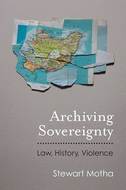Stewart Motha (
Birkbeck College, University of London) published
Archiving Sovereignty: Law, History, Violence with the University of Michigan Press in 2018. From the publisher:
 Archiving Sovereignty shows how courts use fiction in their treatment of sovereign violence. Law’s complicity with imperial and neocolonial practices occurs when courts inscribe and repeat the fabulous tales that provide an alibi for archaic sovereign acts that persist in the present. The United Kingdom’s depopulation of islands in the Indian Ocean to serve the United States’ neoimperial interests, Australia’s exile and abandonment of refugees on remote islands, the failure to acknowledge genocidal acts or colonial dispossession, and the memorial work of the South African Constitution after apartheid are all sustained by historical fictions. This history-work of law constitutes an archive where sovereign violence is mediated, dissimulated, and sustained. Stewart Motha extends the concept of the “archive,” as site of origin and source of authority, to signifying what law does in preserving and disavowing the past at the same time.
Archiving Sovereignty shows how courts use fiction in their treatment of sovereign violence. Law’s complicity with imperial and neocolonial practices occurs when courts inscribe and repeat the fabulous tales that provide an alibi for archaic sovereign acts that persist in the present. The United Kingdom’s depopulation of islands in the Indian Ocean to serve the United States’ neoimperial interests, Australia’s exile and abandonment of refugees on remote islands, the failure to acknowledge genocidal acts or colonial dispossession, and the memorial work of the South African Constitution after apartheid are all sustained by historical fictions. This history-work of law constitutes an archive where sovereign violence is mediated, dissimulated, and sustained. Stewart Motha extends the concept of the “archive,” as site of origin and source of authority, to signifying what law does in preserving and disavowing the past at the same time.
Sovereignty is often cast as a limit-concept, constituent force, determining the boundary of law. Archiving Sovereignty reverses this to explain how judicial pronouncements inscribe and sustain extravagant claims to exceptionality and sovereign solitude. This wide-ranging, critical work distinguishes between myths that sustain neocolonial orders and fictions that generate new forms of political and ethical life.
Praise for the book:
“Set in and around the Indian Ocean,
Archiving Sovereignty is a thoughtful meditation on how the law traffics in fictions—the ‘as if’—as it adjudicates state sovereignty in contexts of colonial and postcolonial violence. Elegantly written, it invites an important consideration of the law’s complex work as historical archivist.” - Avery F. Gordon
“Stewart Motha re-envisions the Indian Ocean as a material site of law, violence, and dispossession that he compellingly terms an ‘archive of the present.’ Drawing comparatively from Australia, South Africa, and the Chagos Archipelago, Motha offers a beautifully crafted analysis of law and sovereignty, how they draw from and disavow their entangled colonial histories.” - Renisa Mawani
“Of the many interwoven themes in
Archiving Sovereignty, the driving motif for me is Kant’s ‘as if,’ which responds to the disappearance of metaphysical objectivity. If objects are the only knowable facts, the unknowable is suspended in the ‘as if.’ This is true for a lie (such as acting as if law were grounded in nature or acting as if sovereignty were a power in itself) as well as for a fertile fiction. We must then think of the ‘as if’ in its relation to an absence of first law, and think of sovereignty as the ‘as if’ of a postulation of ‘nothing’ at the centre of existence. Stewart Motha explores this double dimension, its commingling and unravelling, its aporias and suggestions that are of course inexhaustible. This research is at the heart of the concerns and expectations of the present time.” - Jean-Luc Nancy
“Through a series of brilliant readings of contemporary cases of exile and exclusion the source of legality, the archive, is exposed as an unstable archipelago and excoriated as the fictive mark of sovereign solitude.” - Peter Goodrich
Further information is available
here.

